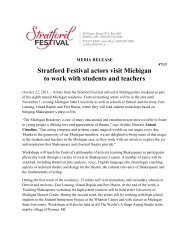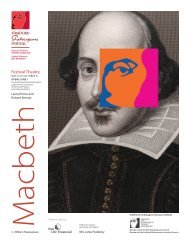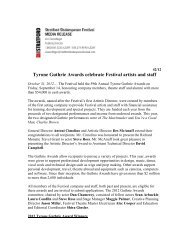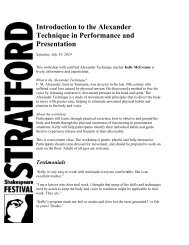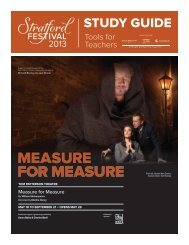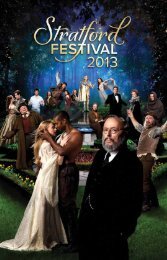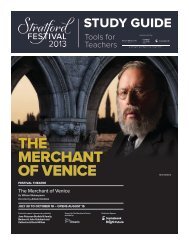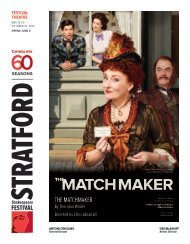ROMEO AND JULIET - Stratford Festival
ROMEO AND JULIET - Stratford Festival
ROMEO AND JULIET - Stratford Festival
You also want an ePaper? Increase the reach of your titles
YUMPU automatically turns print PDFs into web optimized ePapers that Google loves.
Shaw was an ardent socialist and wrote brochures and speeches supporting the Fabian<br />
Society, whose causes included equal political rights for men and women and alleviating<br />
abuses of the working class.<br />
Shaw married Charlotte Payne-Townshend, a fellow Fabian, in 1898, and in 1906 they<br />
moved to a house (now called Shaw’s Corner) in Ayot St. Lawrence, a small village in<br />
Hertfordshire. They remained there their entire lives, although they also maintained a flat<br />
in London.<br />
Shaw’s first financial success as a playwright came from an American production of The<br />
Devil’s Disciple in 1897. He went on to write 63 plays, most full-length. The most<br />
popular of his plays are: Mrs. Warren’s Profession (1893), Arms and the Man (1894 –<br />
presented at the <strong>Stratford</strong> Shakespeare <strong>Festival</strong> in 1982), Candida (1894) and You Never<br />
Can Tell (1897).<br />
Although Shaw is celebrated for his comedy, his most important role was in<br />
revolutionizing British drama. Shaw made the usually frothy, sentimental London theatre<br />
scene into a forum for the discussion of moral, political and economic issues – crediting<br />
Henrik Ibsen, who pioneered modern realistic drama.<br />
During his “middle period,” Shaw wrote Caesar and Cleopatra (1898), Man and<br />
Superman (1903), Major Barbara (1905) and The Doctor’s Dilemma (1906). In 1908, a<br />
musical adaptation of his play Arms and the Man, called The Chocolate Soldier, was<br />
presented. He hated it and forbade the musicalization of his work for the rest of his life. It<br />
was only after his death that the Broadway musical My Fair Lady, based on his<br />
Pygmalion (1912), could be produced. His Saint Joan (1923; presented at the <strong>Stratford</strong><br />
Shakespeare <strong>Festival</strong> in 1975) is generally considered to be one of his better plays. It was<br />
an international success.<br />
In his old age, Shaw’s had become a household name in Britain, and famous throughout<br />
the world. Shaw remains the only person to have been awarded both a Nobel Prize (1925)<br />
for his contribution to literature, and the Academy Award (1938) for writing an adapted<br />
screenplay for Pygmalion. Shaw donated his Nobel Prize money towards the publication<br />
of an English edition of the work of the Swedish playwright August Strindberg, whose<br />
work had never been honoured by the Swedish Academy in charge of the awards.<br />
Shaw died at his home in Hertfordshire in 1950, at age 94, from chronic injuries suffered<br />
from a fall while pruning a tree. His ashes, mixed with those of his wife, were scattered<br />
along the footpaths and around the statue of Saint Joan in their garden. His home is<br />
owned by the National Trust and is open to the public. The Shaw <strong>Festival</strong>, founded in<br />
1982 in Niagara-on-the-Lake, Ontario, is dedicated to producing the works of Shaw and<br />
his contemporaries.<br />
- 30 -



